STATEHOUSE REPORT | ISSUE 20.25 | JUNE 18, 2021
BIG STORY: Littering creates more than trashiness in S.C.
NEWS BRIEFS: State employees, teachers to get more money
LOWCOUNTRY, Ariail: Wolfe was right
COMMENTARY, Brack: State is awash in big spending
SPOTLIGHT: S.C. Senate Democratic Caucus
MY TURN, Atwater: More work needed to curb addiction
FEEDBACK: On Ariail’s cartoons
MYSTERY PHOTO: Take a step in these shoes
Littering creates more than trashiness in S.C.
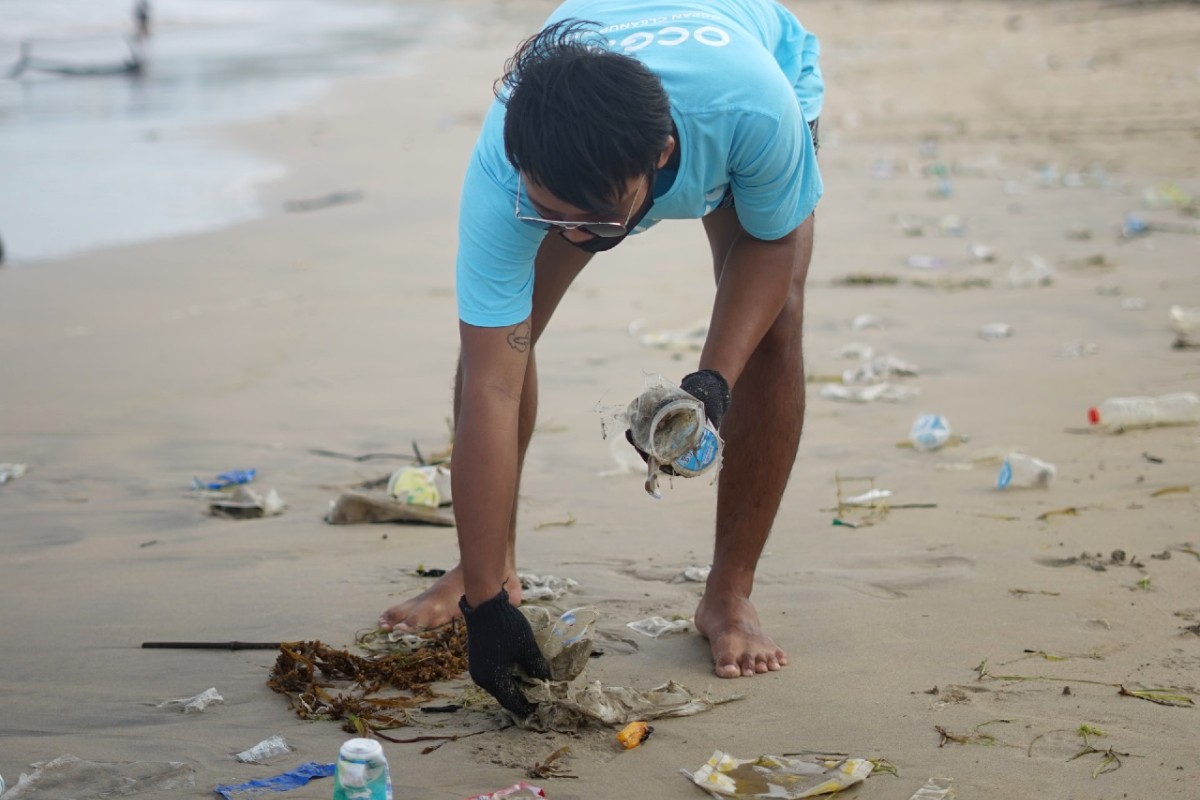
By Skyler Baldwin, special to Statehouse Report | South Carolina has a growing trash problem, in part, because volunteers stayed inside during the pandemic. They worked fewer hours cleaning highways, byways and waterways, according to anti-litter leaders.
And on top of that is the state’s booming development, which causes even more problems, according to neighborhood groups, local government and statewide organizations.
“Every time there’s a new roadway or new houses put in place, there are new travelers using those roadways, and the litter certainly follows suit,” said Jason Kronsburg, director of the City of Charleston’s Department of Parks. “Contractor debris, pickup-truck related, delivery stuff — with the booming economy here, litter is going to happen.”
The accumulation of litter, leaders say, is also triggering issues more urgent than unsightly roadways.
 “It’s not just an eyesore,” said Sarah Lyles, executive director of the statewide PalmettoPride anti-litter organization. “We want people to understand that with Charleston, and tourism being the primary industry, a heavily littered place is going to be dangerous for drivers and pedestrians. It detracts from natural beauty, and it takes resources to clean that could be applied elsewhere. And of course, it pollutes our waters and harms the environment.”
“It’s not just an eyesore,” said Sarah Lyles, executive director of the statewide PalmettoPride anti-litter organization. “We want people to understand that with Charleston, and tourism being the primary industry, a heavily littered place is going to be dangerous for drivers and pedestrians. It detracts from natural beauty, and it takes resources to clean that could be applied elsewhere. And of course, it pollutes our waters and harms the environment.”
Litter discarded along roadways or elsewhere could be contributing to the worsening coastal flooding. Carried by rainwater runoff to storm drains, garbage can clog local drainage systems.
“I don’t think people realize that when you have litter that gets into storm drains, it prevents them from working to allow water to flow through, and that impacts flooding, particularly with creeks and tributaries,” Lyles explained. “We have to keep those waters flowing freely.”
Litter also creates bigger costs
The mess on the side of the road and in streams goes beyond plastic bags, straws or cups tossed aside.
“We can think about litter as waste products that have been discarded incorrectly or at an unsuitable location or in excess,” said Betsy La Force, the S.C. Coastal Conservation League’s communities and transportation senior project manager. “Landfills represent a lot of that. Even if your trash is ending up in a trash can and ultimately landfill, the footprint, the impact of your waste, is still contributing to climate change and greenhouse gasses.
“There’s a much larger environmental cost to sending organic waste to the landfill, where it’s unable to break down in a natural way,” she said. “A lot of people think of food waste as being organic, breaking down on its own, but when it ends up in a landfill, covered up by plastic and compressed down to save space, it’s trying to decompose without oxygen, and that’s what produces the methane gas.”
According to La Force, municipal solid-waste landfills are the third-largest source of human-related methane emissions in the U.S. and the leading contributor to climate change according to the U.S. Environmental Protection Agency (EPA).
South Carolina generates roughly 4.2 million tons of municipal solid waste per year, according to La Force. More than 70 percent of that ends up in landfills, “consuming valuable acreage, blighting the landscape, contaminating the soil and waterways and emitting noxious, polluting gases like methane into the air.”
Efforts abound, but more needed
With the issue growing worse every year, local groups of all sizes have implemented programs and efforts to help reverse the impact of litter.
In addition to the City of Charleston’s Keep Charleston Beautiful program, the city council in May adopted its climate action plan, which includes 12 initiatives and 51 plans to address climate change; one chapter focuses entirely on waste.
That chapter details 10 plans of action to reduce the impact of waste on the climate in the Lowcountry, including the continuation of supporting the elimination of single-use plastics, performing a garbage audit and increasing the number of recycling stations in public spaces.
The South Carolina Aquarium’s “Litter-Free Digital Journal,” launched in 2016, has kept a record of data from members of the community by logging individual pieces of trash.
In 2017, 9,746 83,859 pieces of trash were logged, and 2,333 179,271 were recorded in 2018. The number jumped to 32,600 334,835 in 2019 and more than doubled jumped in 2020 with 74,977 508,232 pieces of trash counted. So far, in 2021, 28,495 232,168 pieces of debris have been collected.
EDITOR’S NOTE: An earlier version of this story underreported the data on debris collected., according to the S.C. Aquarium. The errors have been changed above. We apologize for the errors.
Hotline offers way to bust litterers
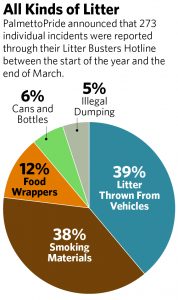
Across the state, PalmettoPride operates a Litter Busters Hotline, an awareness campaign that allows members of the community to be a part of enforcement. People can call in to the hotline when they see someone littering, or a hotspot that needs to be cleaned up.
“We are one of the few states that have one of these hotlines,” Lyles said. “It’s just a way to empower citizens and let them be a part of the enforcement of litter laws and help educate people of the econsequences of their actions.”
PalmettoPride boasts four program areas in total, including education, where they visit classrooms to teach students about littering and community cleanup. But, both Lyles and La Force said more needs to be done at every level to make a dramatic difference in the problematic effects of litter.
“If we can figure out how to encourage more residents to compost, even on their own, or from a municipal collections standpoint where they can roll out food waste and kitchen scraps across the city — it needs to be easy, affordable and accessible, and right now, it’s not,” La Force said.
Composting, she said, needs to be a big priority for solutions.
“That will really help contribute to other issues that are interrelated,” La Force said. “It can make soil more absorbent for stormwater, and it can help establish that farm-to-table loop that many restaurants that source local produce from local farms. It just expands out so far.”
Since implementing the hotline, Lyles said she has seen fewer calls and reports of littering in the area. But, she said that could have been due to the pandemic keeping people inside more often. At the moment, she said, it’s difficult to determine where the numbers are trending.
Report litter through PalmettoPride’s Litter Buster hotline by calling 1-800-7LITTER, online or through their Litter Buster app. A version of this story first appeared in the Charleston City Paper where Baldwin is a staff writer.
- Have a comment? Send to feedback@statehousereport.com
State employees, teachers to get more money

Staff reports | House and Senate negotiators this week put finishing touches on an $11 billion state budget for 2021-22 that legislators will consider next week. The new fiscal year starts July 1.
Earlier this year, House members voted to approve a 3 percent pay hike for state employees, while the Senate sought a 2 percent increase in a year that is awash in cash from unspent reserve funds. Members of the House and Senate conference committee compromised by splitting the difference — a 2.5 percent increase that will cost about $60 million.
The budget also includes a $1,000 per-teacher salary hike, which will cost about $72 million, as well as a bigger pay hike for law enforcement officers to allow them to maintain force strengths.
The proposed budget also has big increases for education, including millions of infrastructure spending as well as more for full-day kindergarten, per-pupil funding, bus driver pay, public charter schools and instructional materials. More: The State | The Post and Courier
In other recent news:
![]() 2 S.C. executions halted until firing squad formed. The S.C. Supreme Court on Wednesday blocked the planned executions of two inmates by electrocution, saying they cannot be put to death until they truly have the choice of a firing squad option as set out in the state’s newly revised capital punishment law. More: AP News.
2 S.C. executions halted until firing squad formed. The S.C. Supreme Court on Wednesday blocked the planned executions of two inmates by electrocution, saying they cannot be put to death until they truly have the choice of a firing squad option as set out in the state’s newly revised capital punishment law. More: AP News.
McMaster picks businessman to lead S.C. commerce. Gov. Henry McMaster on Thursday nominated business executive Harry M. Lightsey III to serve as the next state commerce secretary, putting forth the first new name to lead the agency in more than a decade. More: AP News | Columbia Business Report.
S.C. gov calls for ‘transformative’ investments for COVID-19 relief funds. South Carolina will receive a nearly $8.9 billion share from the latest federal COVID-19 relief package pushed by the Biden administration. More: The Post and Courier | WCSC TV.
McMaster signs Santee Cooper bill, pushes for sale of utility. McMaster says he still wants to sell state-owned utility Santee Cooper after signing into law a bill to overhaul the company. More: WCBD TV.
Cunningham announces plan to curb gun violence. Democratic gubernatorial candidate Joe Cunningham released a plan to curb gun violence in the Palmetto State as Charleston gears up to mark the sixth anniversary of the Emanuel AME Church shooting. More: The Post and Courier | WCBD TV.
Sanford pens book on post-Trump Republican Party. Former S.C. governor and congressman — and one-time Donald Trump Republican presidential primary adversary — Mark Sanford has written “Two Roads Diverged: A Second Chance for the Republican Party, the Conservative Movement, the Nation and Ourselves.” Sanford, who is now working for the lobbying firm Shumaker Advisors in Charleston, told The Post and Courier that he wanted to not only reflect on what post-Trump America looks like but also wants to lay out a political path for making the country successful again. More: The Post and Courier.
Juneteenth becomes federal holiday. President Joe Biden on Thursday signed a measure into law making Juneteenth, an annual celebration of the end of slavery in the U.S., take effect immediately. That means today is considered the first Juneteenth federal holiday despite the occasion formally being on Saturday, June 19. More: The New York Times | The Washington Post.
In S.C. stop, Harris pushes for COVID vaccinations. Vice President Kamala Harris stopped in South Carolina Monday to kick off a nationwide push to vaccinate millions more Americans against the coronavirus ahead of the July 4 holiday. She spoke at a vaccine mobilization event in Greenville. Harris will next head to Atlanta on Friday. More: AP News.
- Have a comment? Send to: feedback@statehousereport.com.
Wolfe was right
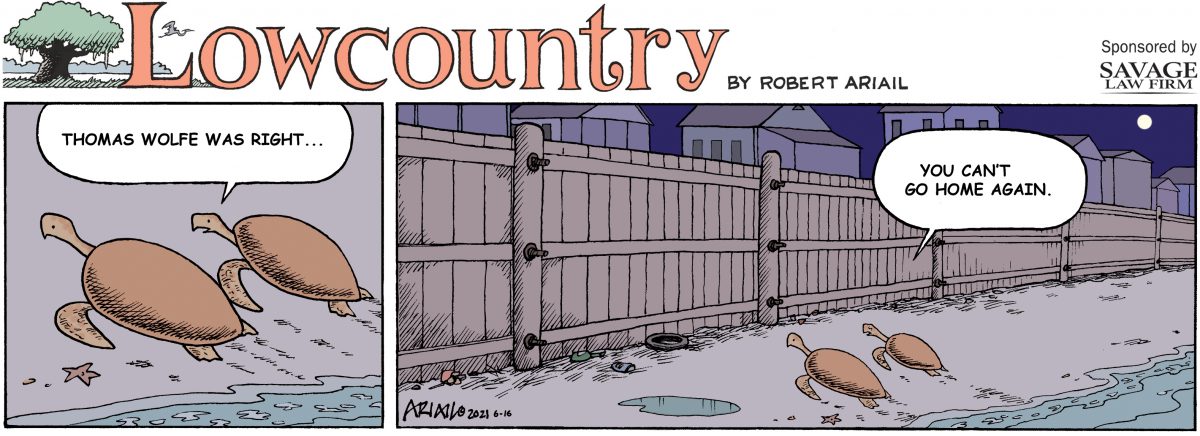
Cartoonist Robert Ariail always has an interesting take on what’s going on in South Carolina. His weekly “Lowcountry” strip is originally drawn for our sister publication, the Charleston City Paper. Love the cartoon? Hate it? What do you think: feedback@statehousereport.com. Check out the Best of Charleston 2021.
State is awash in big spending

By Andy Brack, editor and publisher | A righteous cynic might say the state of South Carolina is about to turn on a spigot of spending that would make a drunken sailor proud.
 But perhaps the state is finally starting to catch up on investments that it didn’t make for years in education, employee salaries and neglected infrastructure.
But perhaps the state is finally starting to catch up on investments that it didn’t make for years in education, employee salaries and neglected infrastructure.
Members of the House and Senate will return to Columbia next week to consider an $11 billion budget compromise hammered out this week by legislative negotiators.
“This is a great budget that focuses on teachers and education, workforce training, infrastructure and law enforcement,” House Ways and Means Chairman Murrell Smith, R-Sumter, said Thursday. “There’s a real concentration on the core functions of government and there are tremendous investments in these areas.”
Lawmakers this year have about $2 billion more than they normally have to spend. First, they have a big pot of unspent money from reserves that accumulated because they didn’t pass a regular budget last year due to the pandemic. Second, the pandemic didn’t cause tax collections to be off as much as first feared. Third, there’s more money coming in thanks to federal largesse.
The state’s new budget calls for millions of spending for state employees — a $1,000 pay raise for each teacher plus a 2.5 percent pay hike for all employees. There’s $114 million for instructional materials at schools and more millions for public charter schools as well as money to keep public colleges from increasing tuition.
Then there’s infrastructure spending. The budget steers about $500 million for colleges and technical schools, including $176 million from 2020-21 reserves, for long-deferred maintenance and renovations, such as stopping water intrusion at one college or adding a lab at another.
More tax dollars at work are at the state Department of Transportation, which has $1.9 billion in revenue from a blend of federal and state sources, including an extra $68 million from two additional cents of gas taxes at the pump. This will be the fifth of six years of two-cent gas tax increases, incremental additions to state coffers that will generate about $287 million this year in revenues for better roads.
Before the gas tax increases started, the state put in about $300 million a year to pave roads. Now it’s projected to spend $642 million this year. Since 2017, it’s spent $2 billion on paving projects, Transportation Secretary Christy Hall said.
On top of increases in the budget and through gas taxes, there’s more infrastructure spending coordinated by other agencies, such as $200 million for the S.C. State Ports Authority and money at the State Fiscal Accountability Authority for land and buildings and Rural Infrastructure Authority for better rural schools.
Even more spending is coming. In the fall, lawmakers will meet again to consider how to use more than $500 million in settlement funds received from the federal government for a decades-long fracas over the Savannah River Site. Then there will be debate on what to do with the state’s $2 billion share of recovery funds from a recent federal stimulus package.
With all of this money floating around, you can see why some might bring up drunken sailors.
What’s missing in all of this spending, particularly the infrastructure spending, is clear accountability. It’s almost impossible to get a clear picture of exactly what the state is doing to build for South Carolina’s future. Perhaps the state should build a holistic transparency tool to publish all of the data in one place so that it’s easy to see what’s happening — and then gauge later whether it is working.
And you know a great place for that? The internet. With more big spending ahead, lawmakers should insist on more transparency so taxpayers can figure out everything that’s going on.
- Have a comment? Send to: feedback@statehousereport.com.
S.C. Senate Democratic Caucus
 The public spiritedness of our underwriters allows us to bring Statehouse Report to you at no cost. This week’s spotlighted underwriter is the S.C. Senate Democratic Caucus. Organized almost 25 years ago, the Caucus has played an important role in many of the historic issues facing our state. As a vibrant minority party in the Senate, its role is to represent our constituents and present viable alternatives on critical issues. The S.C. Senate Democratic Caucus remains a unique place for this to occur in our policy process.
The public spiritedness of our underwriters allows us to bring Statehouse Report to you at no cost. This week’s spotlighted underwriter is the S.C. Senate Democratic Caucus. Organized almost 25 years ago, the Caucus has played an important role in many of the historic issues facing our state. As a vibrant minority party in the Senate, its role is to represent our constituents and present viable alternatives on critical issues. The S.C. Senate Democratic Caucus remains a unique place for this to occur in our policy process.
- Learn more about the Caucus at: www.scsenatedems.org.
More work needed to curb addiction
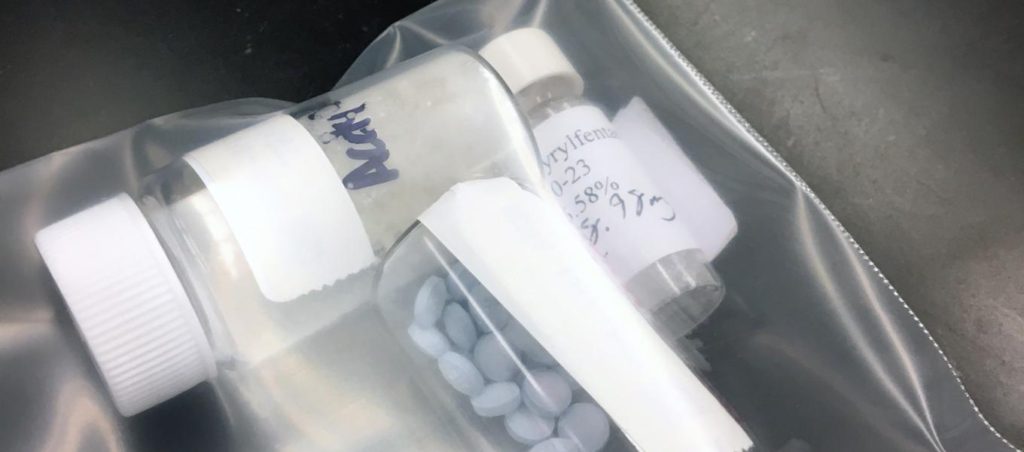
By Todd Atwater, special to Statehouse Report | Addiction is in Lexington County.
It’s in our churches, our families, our communities. Because it is everywhere, it requires all of us to be part of the solution.

I was pleased to see the progress my former colleagues in the S.C. House of Representatives made during this legislation session highlighted in the recent Statehouse Report article Lawmakers have more work to do to rein in opioid crisis.
But I also agree more work needs to be done as we continue to see “hot spots” of high substance misuse across Lexington. When I served as a representative, I was proud to be a member of the House Select Committee on Opioid Addiction. During my tenure, we increased funding to prevent substance abuse, made it easier to reclassify controlled substances to prevent misuse and unlawful sale of opioids, and expanded access to addiction counselors.
As former CEO of the S.C. Medical Association, I worked alongside health care providers to ensure the state’s health care system was equipped to tackle the growing number of alcohol and drug misuse cases in our state. We worked to ensure lifesaving treatment was readily available to those who needed help.
My professional experiences taught me that addiction is not a moral failing, rather substance use disorder is a preventable, treatable brain disease.
But it has been my personal experience that has taught me the most about addiction. Substance use disorders have affected many families, including mine. Raised in a household with an alcoholic stepfather, I saw first-hand the long-term negative effects on the entire family due to his alcohol addiction. Last year, I lost my nephew to a fentanyl-laced marijuana overdose. As our family grieves and continues to mourn his loss, I’m continuing to work to spare other families.
Having served as a longtime member of The Courage Center (TCC) board of directors, I have seen the necessary support provided by an organization that is working hard to destigmatize seeking help for substance misuse. TCC is a safe, non-judgmental space for those seeking support in the Lexington community. TCC staff and committed volunteers support members of our community in their recovery journeys and we believe in each individual’s potential for recovery.
Community is only as strong as each of us. Join me and recovery community allies as we work together to end the stigma of addiction and continue to bring healing and recovery to Lexington County. To learn more about the Courage Over Stigma campaign and how you can help be an ally for recovery, visit couragecentersc.org.
Todd Atwater is a former TCC board member, serving most recently as vice chair. He also has served as a member of the S.C. House of Representatives and is a lifelong Lexington County resident. Have a comment? Send to: feedback@statehousereport.com.
On Ariail’s cartoons
![]() To the editor:
To the editor:
Love it! His originality and overall talent help put sometimes evasive information in perspective in a non-threatening and humorous way. Through pictures, he captures truth that expresses more than words.
He has been doing it for years and his editorial cartoons are a refreshing and welcome part of my day.
— Miriam Mitchell. Seabrook, S.C.
Send us your thoughts, but also provide contact info
We receive a few comments a week and look forward to publishing. But often we can’t because we can’t verify the identity of the writer.
To be published, you’ve got to provide us with contact information so we can verify your letters. Verified letters to the editor are published weekly. We reserve the right to edit for length and clarity. Comments are limited to 250 words or less. Please include your name and contact information.
- Send your letters or comments to: feedback@statehousereport.com
Take a step in these shoes
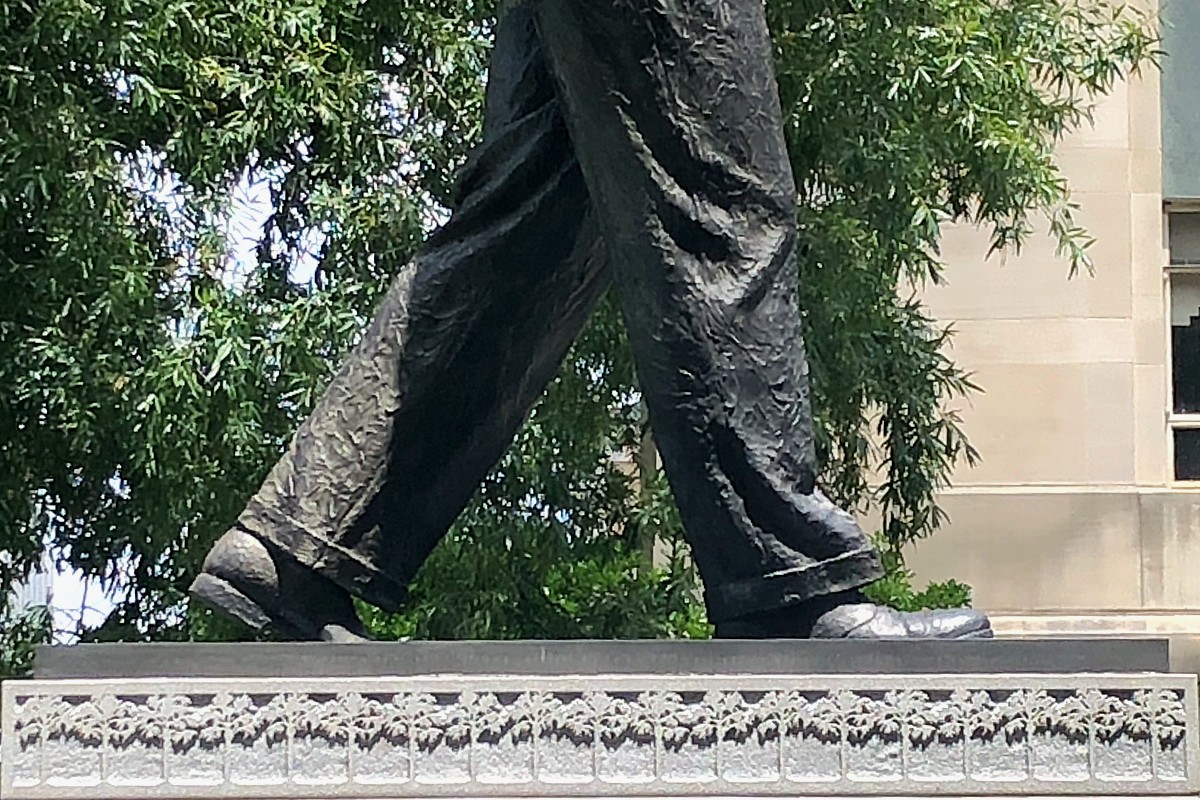
Here are some big shoes to fill. Whose are they and where is this located? Send your guess to feedback@statehousereport.com — and remember to include your name, home city and contact information.
 Last week’s mystery, “Cool bridge,” was a picture sent in by Summerville reader Frank Bouknight when he was floating on the Ashley River. It showed the CSX rail bridge near Drayton Hall.
Last week’s mystery, “Cool bridge,” was a picture sent in by Summerville reader Frank Bouknight when he was floating on the Ashley River. It showed the CSX rail bridge near Drayton Hall.
Congratulations to those who identified it: Allan Peel of San Antonio, Texas; Kevin Mertens of Greenville; Jay Altman and Elizabeth Jones, both of Columbia; Jacie Godfrey of Florence; and George Graf of Palmyra, Va. NOTE: If you sent us an email identifying the bridge but don’t see your name, we apologize in advance. Some emails didn’t get through last week due to a technical glitch.
Peel shared that the bridge crosses the Ashley River in Charleston near Brevard Road and the Seagate Village condominium complex. “The bridge was built in 1927 and is a bascule deck-girder bridge is a railroad bridge over Ashley River. When closed, there is a limited 3-foot vertical clearance under the bridge. When opened, it affords a 60-foot horizontal clearance for passing boats. Under normal operation the bridge will open on signal and as required (i.e., ‘on signal’) between 7 a.m. and 11 p.m. From 11 p.m. to 7 a.m., a request to open the drawbridge can be made, but only if at least three hours notice is given.”
- Send us a mystery. If you have a photo that you believe will stump readers, send it along (but make sure to tell us what it is because it may stump us too!) Send to: feedback@statehousereport.com and mark it as a photo submission. Thanks.
 ORDER NOW: Copies are in Lowcountry-area bookstores now, but if you can’t swing by, you can order a copy online today.
ORDER NOW: Copies are in Lowcountry-area bookstores now, but if you can’t swing by, you can order a copy online today.
ABOUT STATEHOUSE REPORT
Statehouse Report, founded in 2001 as a weekly legislative forecast that informs readers about what is going to happen in South Carolina politics and policy, is provided to you at no charge every Friday.
Meet our team
- Editor and publisher: Andy Brack, 843.670.3996
- Special correspondent: Lindsay Street
Donate today
We’re proud to offer Statehouse Report for free. For more than a dozen years, we’ve been the go-to place for insightful independent policy and political news and views in the Palmetto State. And we love it as much as you do.
But now, we can use your help. If you’ve been thinking of contributing to Statehouse Report over the years, now would be a great time to contribute as we deal with the crisis. In advance, thank you.
Buy the book
Now you can get a copy of editor and publisher Andy Brack’s We Can Do Better, South Carolina! ($14.99) as a paperback or as a Kindle book ($7.99). . The book of essays offers incisive commentaries by editor and publisher Andy Brack on the American South, the common good, vexing problems for the Palmetto State and interesting South Carolina leaders.
More
- Mailing address: Send inquiries by mail to: P.O. Box 21942, Charleston, SC 29413
- Subscriptions are free: Click to subscribe.
- We hope you’ll keep receiving the great news and information from Statehouse Report, but if you need to unsubscribe, go to the bottom of the weekly email issue and follow the instructions.
- Read our sister publications: Charleston City Paper (every Wednesday) | Charleston Currents (every Monday).
- © 2021, Statehouse Report, a publication of City Paper Publishing, LLC. All rights reserved.















 We Can Do Better, South Carolina!
We Can Do Better, South Carolina!